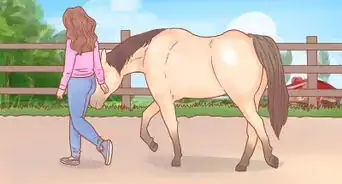This article was co-authored by wikiHow Staff. Our trained team of editors and researchers validate articles for accuracy and comprehensiveness. wikiHow's Content Management Team carefully monitors the work from our editorial staff to ensure that each article is backed by trusted research and meets our high quality standards.
This article has been viewed 28,272 times.
Learn more...
You love working outside, working hard, working with your hands, and you’re a horse fanatic. That’s why being a horse wrangler might be the perfect job for you. Horse wranglers not only herd horses, but sometimes train or personally care for them as well. The long hours, the dirt, and the travelling may not be for everyone though. Consider your lifestyle, your abilities, and whether or not you’re ready for a ‘round-the-clock commitment to your job. Horse wrangling offers wonderful opportunities, but is demanding work, and it might be just the job for you.
Steps
Applying for the Job
-
1Review job requirements. There isn’t any one tried and true job description for horse wranglers. Most horse wranglers work on ranches, although some are employed in Hollywood to assist in filmmaking. At the minimum, most horse wranglers:[1]
- Clean up horse poop.
- Feed, brush, and clean horses.
- Herd horses.
- Lead tours.
- Some horse wranglers may assist in training horses also.
-
2Look for open positions at public and privately-owned ranches. The federal government maintains millions of acres of protected lands, much of which houses wild and tamed horses. Also, there are privately-owned ranches throughout the country, from one coast to the other. You can search websites, local horse enthusiast groups, and also the government’s employment website. Also, local feed stores are a great resource for wrangler openings.[2]
- If there is a particular area of the country that you’re set on living and working in, limit your search to that area. Otherwise, you’ll have the best chances of finding the perfect position if you open up your search to a region or, better yet, nationally.
Advertisement -
3Ask about what might exclude your application. Privately-owned and government-run ranches each have their own exclusions, so you’ll want to review each application carefully before you submit one. For example, when applying to work for the federal government as a Horse Wrangler, you can’t hold an active real estate license, nor can you have any interest or stock in federal land. Some private ranches may exclude smokers or convicted felons.
- Each job announcement should include any exclusions. If you’re unsure, though, make sure to ask if you think there might be a conflict with your application.
-
4Have your supporting documents ready. When you’re hired, you’ll need to provide supporting documents as part of your new-hire paperwork, and possibly to support your application. Before you apply for horse wrangler positions, gather your supporting materials so that you have them ready to go as soon as you’re asked for them. This not only makes a good impression with your future employer, but ensures that you won’t hit any snags when getting hired. You’ll want:
- A state-issued photo identification, such as a driver’s license
- Your social security card
- Proof of first aid and CPR certifications
- Proof of wilderness survival training, if you have it
- Proof of address, such as with a utility bill in your name
Training for the Job
-
1Work your way up. If you’re just starting out and don’t have experience as a wrangler, you won’t likely work as an actual wrangler right away. Usually you have to work your way up to that position through experience, training, and seniority. Ultimately, you should be promoted to Lead Wrangler, making you the supervisor of all other wranglers on the ranch.
-
2Attend wrangler school. You may get a leg up on the competition if you put yourself through wrangler school, although many, if not most, positions will send you to wrangler school as a condition of your probation. Wrangler school will teach you the essential information necessary for any horse wrangler, whether they work for a private or public property.[3]
- Most horse-wrangler programs take anywhere from 4-6 weeks.
- You’ll learn a variety of important skills, such as knot tying, trail riding, anatomy and behaviors of horses, saddling and shoeing horses, and other relevant skills.
- The cost is typically $1000 – 1700 dollars. Ask potential employers if they will reimburse you for the cost of attending wrangler school.
- Some schools use a letter grade system (A+ – F), whereas others use a pass/fail system. Most schools require you to pass quizzes and tests to successfully complete the program.
-
3Learn from your peers and your mistakes. As a new horse wrangler, nobody expects you to know everything that it takes to be a great wrangler. You will be expected to pay attention to what others are doing, listen to their guidance, and certainly to learn from your mistakes. If you don’t know how to do something, just ask someone to explain it to you.
- Don’t pretend to know how to do something that you don’t have experience with. The safety of the horses and your colleagues relies on everyone doing specific jobs.
-
4Get the right clothes and gear. Most employers will supply you with a saddle and the basic tools of the trade, but it’s up to you to outfit yourself correctly and to purchase any gear that you might want. Clarify with your employer what they will provide and what you’re expected to purchase.
- You want to bring sturdy jeans, boots, t-shirts, and long-sleeve shirts.
- You might want a hat or bandana as well.
- To save some money, look at local thrift stores for your clothing. You’ll be getting very dirty and there’s no need to spend money on clothes that will get ruined pretty quickly.
- You might be expected to bring your own bedding, flashlights, and toiletries too.
Setting Realistic Expectations
-
1Expect to be tired. Horse wrangling is physically and mentally exhausting work. Your job will start daily before the sun comes up and end long after it’s gone down. You’ll be on your feet or on a horse all day with little time to relax. Remember, too, that some ranches don’t allow days off; instead, they expect that you’ll work a couple of months with no days off for the span of a “season.”
- More permanent positions will give you time off, whereas more temporary positions typically will not.
- Whether this is a permanent position or seasonal work, you will put in long hours and a lot of hard work. You’ll be tired.
-
2Make friends while you’re there. You may be hired with a group of other new wranglers, or you may be a single addition to an already-established team. In either scenario, you want to make friends with your colleagues if you can. Don’t force the relationships, of course, but always keep in mind that you rely on one another, and that you’re all learning how to work together.
- It’s important that you communicate effectively with your colleagues and that you don’t get frustrated with them or yourself.
-
3Have some prior knowledge of horses before you become a wrangler. It wouldn’t make any sense for you to try and be a mechanic having no knowledge of cars and it makes just as little sense to try and be a horse wrangler without some knowledge of horses. Your employer will want to see that you know about horses, their temperaments, how to care for them, and that you show a true passion for these animals, all before you’re hired.
- Your local library should have a variety of books, videos, and digital resources available to instruct you about horses and their care.
Community Q&A
-
QuestionWhat college courses should I take to prepare me to become a professional, well paid horse wrangler?
 Community AnswerWranglers are not payed the most, but you should start with riding horses well and then find a ranch you want to work at. You don't need college.
Community AnswerWranglers are not payed the most, but you should start with riding horses well and then find a ranch you want to work at. You don't need college. -
QuestionHow much money do horse wranglers make?
 CrystalCommunity AnswerThey make around $31,270 a year, that's just an average salary.
CrystalCommunity AnswerThey make around $31,270 a year, that's just an average salary. -
QuestionWhat are the requirements for being a horse wrangler?
 Community AnswerFirst, you will need experience with horses. Five or more years is highly recommended. You will need to know basic equine behavior, including their psychological and physiological needs, among other things.
Community AnswerFirst, you will need experience with horses. Five or more years is highly recommended. You will need to know basic equine behavior, including their psychological and physiological needs, among other things.
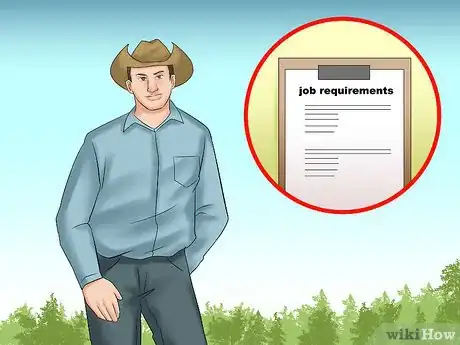



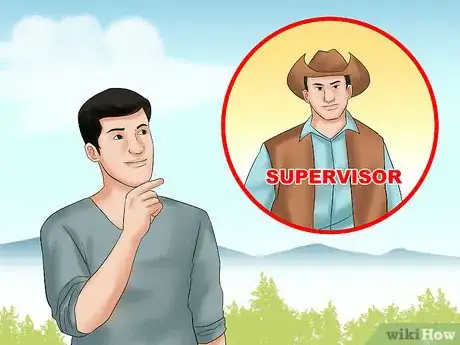
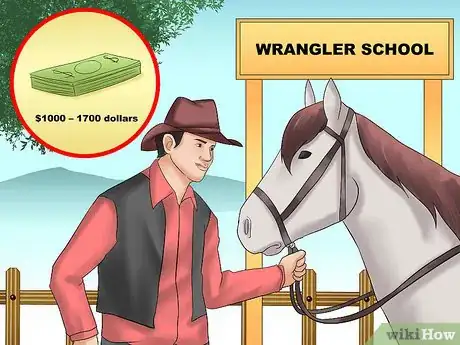

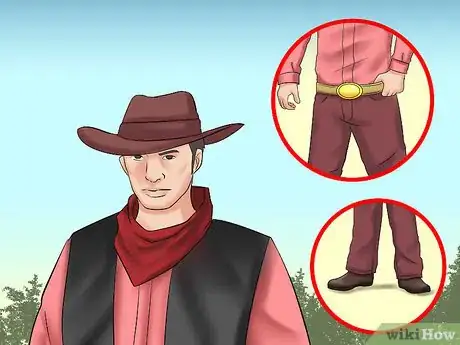
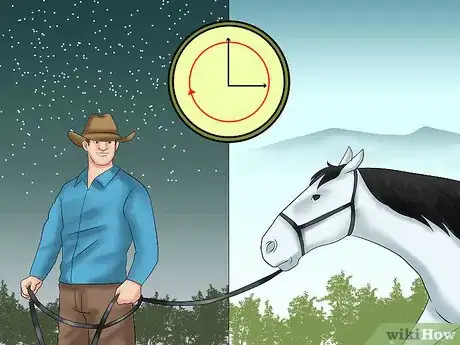
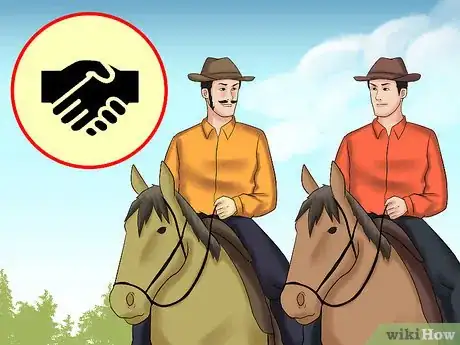

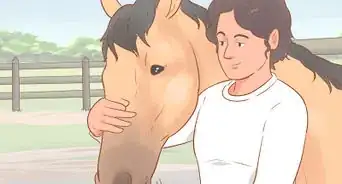


-in-Horses-Step-4-Version-2.webp)
